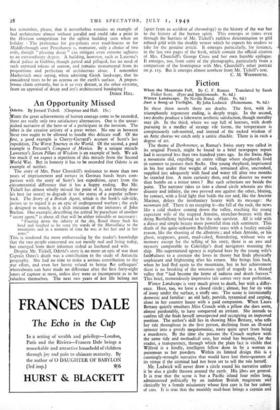An Opportunity Missed
Odette. By Jerrard Tickell. (Chapman and Hall. 15s.)
WHEN the great achievements of human courage come to be recorded, there are really only two satisfactory alternatives. One is the unvar- ”pished narrative of the hero or of a participant in the heroism. The other is the creative artistry of a great writer. No one in between 'these two ought to be allowed to handle this delicate stuff. Of the first, a good example is Cherry-Garrard's account of Scott's last 'expedition, The Worst Journey in the World. Of the second, a good example is Prescott's Conquest of Mexico. By a unique miracle 1...awrence's Seven Pillars of Wisdom is an example of both. We ask 'too much if we expect a repetition of this miracle from the Second ;World War. But in honesty it has to be recorded that Odette is an example of neither.
The story of Mrs. Peter Churchill's resistance to more than two years of imprisonment and torture in German hands bears com- parison with the story of Scott's last expedition, apart from the circumstantial difference that it has a happy ending. But Mr. 'Ticket' has almost wholly missed the point of it, and thereby done his best (or worst) to degrade it to the status of a popular yellow- back. The Story of a British Agent, which is the book's sub-title, invites us to regard it as an epic of underground warfare ; the style is designed to match, in a slick imitation of the imitators of John Buchan. One example, describing the arrival by parachute of another " secret agent," is about all that will be either tolerable or necessary : " Floating down the infinity of the sky, Raoul threw back his head and laughed as he sung the words of the Marseiliaise to the
mountains and in a moment of time he was at her feet and in her arms."
This is rendered the more embarrassing by the reader's knowledge that the two people concerned are not merely real and living today, but emerged from their inhuman ordeal as husband and wife.
Despite Mr. Tickell, Odette's story is no more an epic of war than Captiin Oates's death was a contribution to the study of Antarctic geography. She had no time to make a serious contribution to the war effort, and even her heroic refusal to betray her colleagues' ;whereabouts can have made no difference after the first forty-eight hours of capture at most, unless they were so incompetent as to be Iralueless themselves. The next two years of her life belong not
(apart from an accident of chronology) to the history of the war but to the history of the human spirit. This emerges at • times even through the barriers of Mr. Tickell's ruthless determination to gild refined gold with the shoddy veneer which he expects his readers to take for the genuine article. It emerges particularly, for instance, in the last two pages of the book, which contain the official citation of Mrs. Churchill's George Cross and her own humble epilogue. It emerges, too, from some of the photographs, particularly from a comparison of the frontispiece with Mrs. Churchill's other portrait on p. 115. But it emerges almost nowhere from Mr. Tickell's text.
C. M. WOODHOUSE.






































 Previous page
Previous page